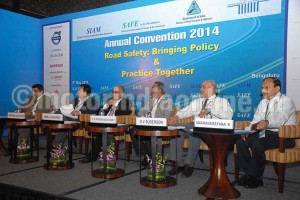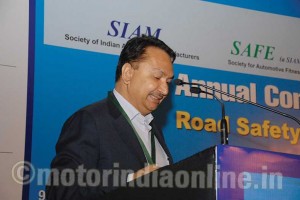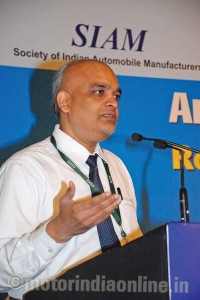
The Society for Automotive Fitness & Environment (SAFE), a SIAM initiative, in association with the Ministry of Road Transport & Highways, Karnataka Transport Department and the All India Federation of Motor Vehicle Department, recently organised its annual convention in Bangalore with the theme “Road Safety: Bringing Policy & Practice Together”.
The convention aimed at addressing rising concerns over road fatalities, with traffic collisions on Indian roads amongst the highest in number in the world. According to a National Crime Records Bureau (NCRB) report, more than 1,35,000 traffic collision-related deaths occur in India every year. The International Road Federation (IRF) estimated in 2012 that traffic collisions result in an annual monetary loss of $20 billion in India. This figure includes expenses associated with the accident victims, property damaged and administration expenses.
The inaugural session was addressed by Mr. Vikram S. Kiroloskar, SIAM President, Mr. P.N. Sreenivasachary, Principal Secretary (Transport), Mr. Amaranarayana K, Transport Commissioner of Karnataka, Mr. S.V. Suderson, SAFE President, and Dr. Venkat Srinivas, SAFE Vice President.

Speaking at the convention, Mr. Suderson observed: “The issue of road safety is very crucial in India. Loss of life is not only huge in terms of numbers, but majority of people affected are from the younger age brackets. We have a long way to go before our roads become safe for all users. Understanding the complex problems is the first step. Physical and mental health of motorists, their vehicle condition and pedestrians’ behaviour are some of the key factors. We need to address each of these stakeholders to raise the overall standard of road safety”.
Mr. Vikram Kirloskar expressed his happiness over the efforts put in by SAFE over the last one year and said: “Community education is crucial to improve road safety. SAFE has worked along with government authorities and regulators to raise awareness through an innovative and collaborative approach and has conducted several activities to take the mission forward. I wish them all the best for their future endeavours”.

The convention went on to hold three focussed sessions which threw light on the various aspects of road safety. The first session discussed best practices and policies to enhance road safety, with a presentation from the Karnataka Transport and Traffic Police Department on better policies and practices in the area of road safety. This was followed by a presentation on adoption of safety practices by the Indian automotive sector by Volvo. The session concluded with an overview on safety policies by the All India Federation of Motor Vehicle Department.
The second session focused on international and national learning on vehicular safety and technology innovations. This comprised insightful contributions by the International Motorcycle Manufacturers Association that gave an overview of global approaches for safer motorcycling and a presentation on global practices for reduction of road fatalities by Honda Motor Co. Ltd. of Japan. The session closed with addresses on new safety technologies and innovations in the Indian automobiles sector by Nissan and Bosch respectively.
The final session comprised a panel discussion moderated by Mr. Vishnu Mathur, Director General, SIAM, with representatives from the Transport Department of Karnataka and Tamil Nadu, the Institute of Driving & Traffic Research and KPIT Cummins. The panelists shared their thoughts on implementation of policies and practices in the area.